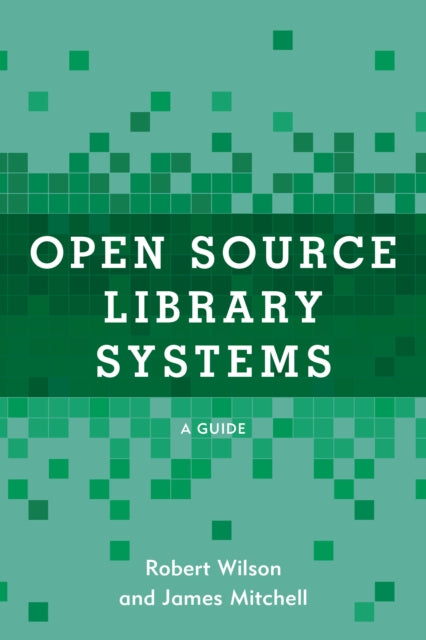Robert Wilson,James Mitchell
Open Source Library Systems: A Guide
Open Source Library Systems: A Guide
YOU SAVE £3.22
- Condition: Brand new
- UK Delivery times: Usually arrives within 2 - 3 working days
- UK Shipping: Fee starts at £2.39. Subject to product weight & dimension
Bulk ordering. Want 15 or more copies? Get a personalised quote and bigger discounts. Learn more about bulk orders.
Couldn't load pickup availability
- More about Open Source Library Systems: A Guide
Open source alternatives to integrated library systems can save libraries tens to hundreds of thousands of dollars a year by better matching their functional needs.
Format: Paperback / softback
Length: 174 pages
Publication date: 11 September 2021
Publisher: Rowman & Littlefield
The open-source alternative to integrated library systems can provide significant cost savings for libraries, ranging from tens to hundreds of thousands of dollars annually, while also more closely aligning with their functional requirements. By understanding the benefits and limitations of open-source solutions, libraries can make informed decisions about their technology infrastructure and ensure that they are utilizing the most efficient and effective tools available to support their services and collections.
The open-source alternative to integrated library systems offers a compelling solution for libraries seeking to optimize their technology infrastructure and reduce costs. By leveraging the power of open-source software, libraries can achieve a more flexible and customizable system that meets their specific functional needs. In this comprehensive guide, we will explore the benefits and limitations of open-source solutions, as well as provide practical tips and best practices for implementing and managing an open-source library system.
Benefits of Open-Source Solutions:
Cost Savings: Open-source solutions are typically free or significantly cheaper than proprietary software. This cost savings can be particularly significant for smaller libraries or libraries with limited budgets.
Flexibility and Customization: Open-source systems are highly customizable, allowing libraries to tailor the system to their specific requirements and workflows. Libraries can modify the software, add new features, and integrate with other systems and services as needed.
Community Support: Open-source software is developed and supported by a large and active community of developers and users. This community provides valuable resources, support, and expertise, making it easier for libraries to resolve issues and improve their systems.
Scalability: Open-source systems are designed to be scalable, allowing libraries to grow and expand without the limitations of proprietary software. Libraries can easily add new users and resources as their needs evolve.
Security: Open-source software is generally more secure than proprietary software, as the source code is available for scrutiny and analysis. Libraries can also benefit from the security expertise of the community and take advantage of security updates and patches.
Limitations of Open-Source Solutions:
Learning Curve: Implementing and managing an open-source system can be challenging, especially for libraries with limited technical resources or staff. It may require a significant investment of time and effort to learn the software and configure it to meet the library's needs.
Customization Limitations: While open-source systems are highly customizable, there may be limitations to what can be achieved without extensive programming or development skills. Libraries may need to hire third-party developers or consultants to customize the system to their specific requirements.
Support and Maintenance: Open-source software is typically provided by volunteers or community-based organizations. While this support can be valuable, it may not be as comprehensive or timely as support provided by commercial software companies. Libraries may need to plan for self-support or engage with a support provider to ensure they have access to the necessary resources and expertise.
Compatibility Issues: Open-source software may not be fully compatible with other systems and services in a library's infrastructure. Libraries may need to invest time and resources in testing and troubleshooting compatibility issues to ensure a smooth integration.
In conclusion, the open-source alternative to integrated library systems offers a compelling solution for libraries seeking to optimize their technology infrastructure and reduce costs. By understanding the benefits and limitations of open-source solutions, libraries can make informed decisions about their technology infrastructure and ensure that they are utilizing the most efficient and effective tools available to support their services and collections.
Weight: 346g
Dimension: 228 x 151 x 15 (mm)
ISBN-13: 9781538141397
This item can be found in:
UK and International shipping information
UK and International shipping information
UK Delivery and returns information:
- Delivery within 2 - 3 days when ordering in the UK.
- Shipping fee for UK customers from £2.39. Fully tracked shipping service available.
- Returns policy: Return within 30 days of receipt for full refund.
International deliveries:
Shulph Ink now ships to Australia, Belgium, Canada, France, Germany, Ireland, Italy, India, Luxembourg Saudi Arabia, Singapore, Spain, Netherlands, New Zealand, United Arab Emirates, United States of America.
- Delivery times: within 5 - 10 days for international orders.
- Shipping fee: charges vary for overseas orders. Only tracked services are available for most international orders. Some countries have untracked shipping options.
- Customs charges: If ordering to addresses outside the United Kingdom, you may or may not incur additional customs and duties fees during local delivery.


